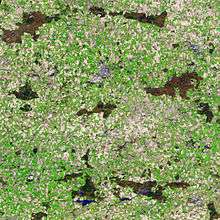Pays de la Mée
Coordinates: 47°42′N 1°24′W / 47.700°N 1.400°W

The Pays de la Mée (French pronunciation: [pɛ.i.də.la.me])) (Breton: Bro-Vaez; Gallo: Paeyi de la Mée) is a historical region of France which was part of the Duchy of Brittany before the French Revolution. It was then split between Loire-Atlantique and Ille-et-Vilaine department. Its capital is Châteaubriant, and the dialect traditionally spoken there is the Gallo language.
Geography

The area lies on the eastern border of Brittany, facing Anjou (nowadays Maine-et-Loire departement). Most of the territory is part of Loire-Atlantique, but several villages in Ille-et-Vilaine are usually included in the Pays de la Mée. Moreover, its limits are not very clear; for example, Candé, a small town in Anjou, was named Candé-en-la-Mée during the Middle Ages.
The landscape of the Pays de la Mée is hilly because it is on the eastern extremity of the Armorican massif. The ground is mostly made of schist and contains small amounts of iron ore, particularly exploited during the 19th century. The area is also crossed by several small rivers, such as the Don, and watermills used to be numerous. The area is mainly devoted to agriculture, especially cattle breeding.
History
Pays de la Mée means "pays du milieu" ("middle-country") in French. The area is located between Angers, Nantes and Rennes, and it was around the 10th century a buffer zone, where the counts of each city were fighting. It also has an old mercantile tradition, the fair at Châteaubriant, was for instance founded in 1049. The Pays de la Mée is first mentioned in 1055. It disappeared as an administrative unit around 1270, when the counties of Nantes and Rennes merged into one single state.[1]
The appellation "Pays de la Mée" saw a revival during the 1970s, and several institutions bear this name, such as a theatre. Its limits also corresponds to the Pays de Châteaubriant, a group of 33 communes.[2]
_-_La_Meilleraye-de-Bretagne.jpg) The Abbaye de Melleray.
The Abbaye de Melleray..jpg) Half-timbered house, Châteaubriant.
Half-timbered house, Châteaubriant._-_Moisdon-la-Rivi%C3%A8re.jpg) Old forge in Moisdon-la-Rivière.
Old forge in Moisdon-la-Rivière._-_Abbaretz.jpg) A manor in Abbaretz.
A manor in Abbaretz._-_Abbaretz.jpg) Ruins of a forge in Abbaretz.
Ruins of a forge in Abbaretz.
References
- ↑ Chateaubriant.org (ed.). "Le château médiéval" (in French).
- ↑ Chateaubriant.org (ed.). "Marche de Bretagne et Pays de la Mée" (in French).